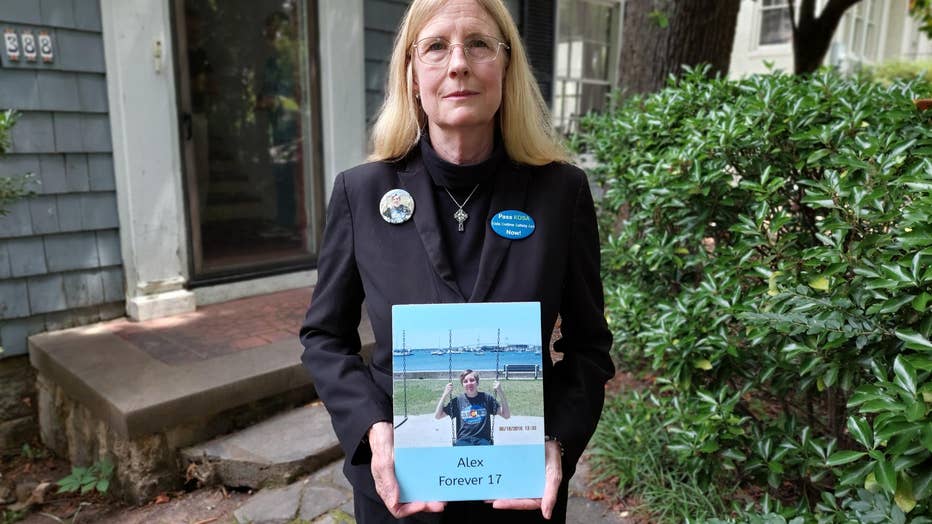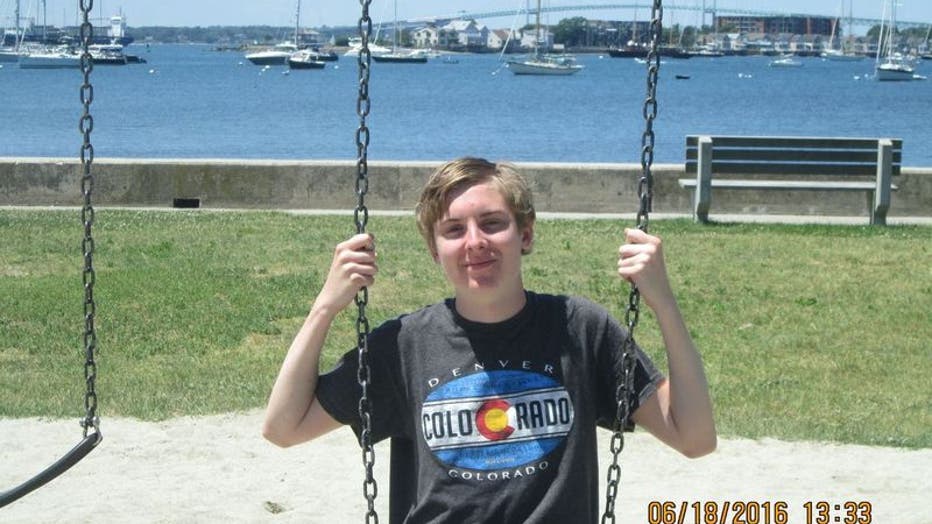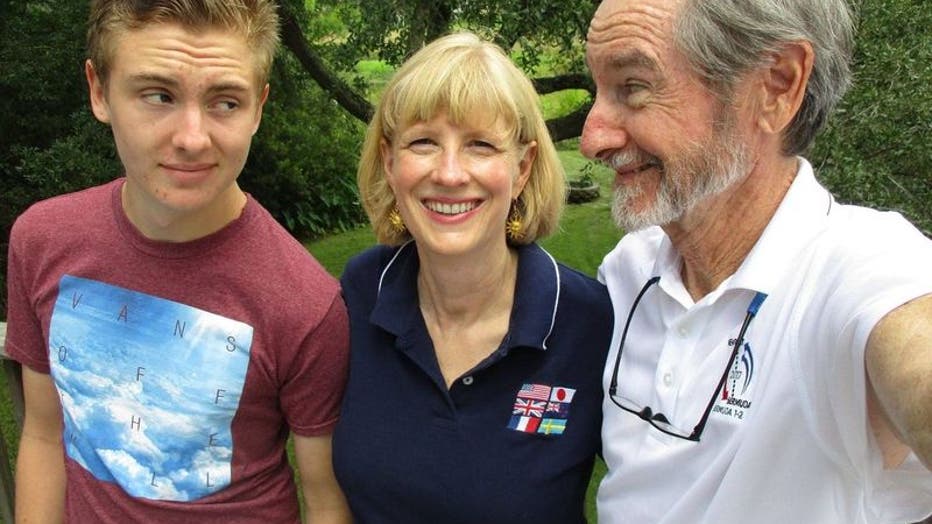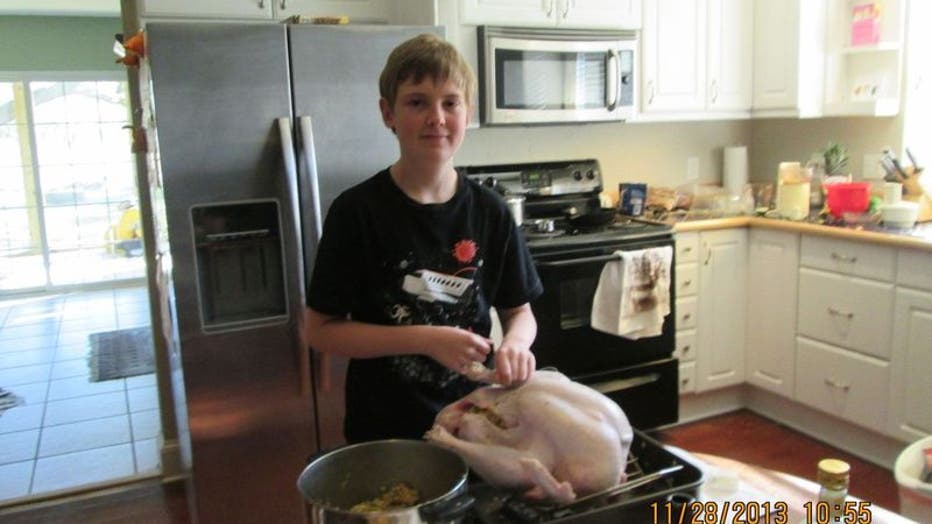After 17-year-old son's suicide, Atlanta mom pushes for bill to protect kids online
Atlanta mother on a mission to end suicide
An Atlanta mother lost her 17-year-old son to suicide nearly seven years ago. Since then, she has lobbied Congress to pass the Kids Online Safety Act (or KOSA) to force social media companies to do more to protect minors from cyberbullying on their platforms.
ATLANTA - For years, Sharon Winkler says, she was a fan of social media.
"I was a techno-optimist," Winkler says. "I thought it was wonderful."

Sharon Winkler of Atlanta poses with a photo of her son, Alex Peiser, who died by suicide after receiving bullying messages online. (Beth Galvin FOX 5)
But the loss of Winkler's 17-year-old son Alex Peiser to suicide changed everything.
"Alex was a really great kid," Winkler says. "I mean, he was so sweet, and he was smart."
Spread out on the dining room table of the family's Atlanta home are photos of Winkler's youngest son at the beach, theater camp and his prized Star Wars Lego collection.

Alex Peiser, 17, died by suicide in 2017, after going online looking for support after a breakup. Instead, his mother says, he received bullying messages from strangers telling the teen he would never find love again.
"He was active in Boy Scouts, and his church youth group, and in band and in theater," his mother says.
In October 2017, Alex Peiser was beginning his junior year at his South Carolina high school.
"Unfortunately, Alex broke up with his girlfriend, and he went online looking for support," Winkler says. "Instead, he got messages that, 'You are ugly,' that, 'You are unlovable,' that, 'You will never find love in your life.'"
The messages, she believes, were from strangers.
They had talked about his online use, but he never mentioned the messages, Winkler says.
"He didn't tell me that those were the kinds of messages he was getting until he put it in a suicide note," Winkler says. "I think he was ashamed that these online messages were affecting him so dramatically."
And, when Alex Peiser died in 2017, Winkler says, no one was talking about cyberbullying or the potential harms of social media.

Alex Peiser poses in an undated photo with his mother Sharon Winkler and stepfather Noel Winkler. Alex died by suicide after his mother says he received bullying messages online from strangers.
"You'd tell people what happened to your child, and they look at you like you were crazy, you know, that can't be possible," Winkler remembers.
"The marketers say, 'Oh, it's fun, and you'll build community, and you'll get support," Winkler says. "And, yet, there's a downside, and it's a really bad downside."
Winkler is now part of Parents for Safe Online Spaces, parentssos.org.
She has also created the website SocialMediaHarms.org.
"The Big Tech message was, 'There is no proof that, our products cause any problems whatsoever,'" Winkler says. "So, my website is just a list of peer-reviewed research articles that demonstrate the harms of online use."
Winkler has joined other bereaved parents in urging Congress to pass the Kids Online Safety Act, or KOSA, which would force social media companies to prioritize the safety of children on their platforms.
"KOSA rules require that every platform have their highest safety measures for minors 16 and under," Winkler says.
KOSA, she says, would restrict who can communicate with minors online, or get access to their personal data.
Teens would be able to search for topics of interest, but KOSA would allow them to automatically opt-out of algorithms suggesting posts that are trending, which, Winkler says, are likely to be more emotionally-charged.
She believes algorithms are at the heart of the issue.
"Because the kids are getting messages that they're not choosing, they're not asking for; they're being sent to them," Winkler says. "And, it's not just pro-suicide, it's pro-eating disorder, it's pro-cutting."
The bill would also require platforms to give parents tools to manage their children's privacy settings, track their usage metrics and report online harms.
"Kids are on 5, 7 different apps," Winkler says. "It's overwhelming."
For now, Winkler urges parents and caregivers to talk to kids about how to handle unwanted contact online.
"If they're approached by an adult they don't know online, they need to tell somebody," she says. "If they're getting messaging over and over, that are distressing to them, they need to tell an adult."

Alex Peiser poses for a photo at Thanksgiving. (Sharon Winkler)
It's been nearly 7 years since Alex Peiser died.
Retired from the Navy, Sharon Winkler has found a new mission: to protect the next generation of kids like Alex.
"I'm hoping that he would be proud of me," Winkler says . "I know that he would not want anyone else to experience what he experienced."

